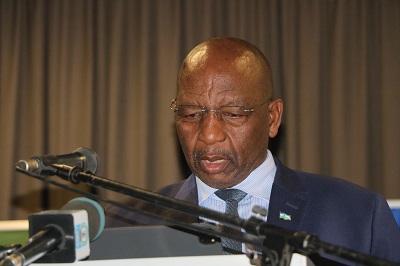By: Thoboloko Ntšonyane
MASERU – In its Extra-Ordinary Summit of the Heads of State and Government, the Southern African Development Community (SADC) holds a virtual summit on Monday this week.
The Summit launches a $5.5 billion, M100 billion regional humanitarian appeal aimed at strengthening the domestic resources of affected members.
This initiative mobilizes national, regional, and international partners in response to the effects of El Niño-induced droughts and floods.
The funds will support comprehensive efforts to mitigate the impact on vulnerable communities, ensuring a coordinated and robust response to the crisis.
The Prime Minister Rt Hon Ntsokoane Matekane represents Lesotho in this Summit.
“[The] Summit notes the multifaceted and cascading impact of the El Niño induced drought and floods across multiple sectors, including Agriculture and Livelihood Security, Nutrition, Health, Water and Energy, and calls for coordinated, integrated and harmonized interventions to address the adverse impact of El Niño.
“[The] Summit receives a report on the impact of disasters in the region and expresses concern over the humanitarian situation brought about by El Niño-induced drought and floods, which continues to affect over 61 million people,” reads the SADC communiqué.
The Summit also notes the receipt of the recent climate and weather situation in the region as well as their impacts on the socio-economic development and effect on basic commodity prices.
The Heads of State and Government further call on the Members State to be “proactive” in strengthening the anticipatory action programmes aimed at addressing climate associated risks such as La Niña phenomenon, which is projected for the 2024/2025 season.
In its efforts to address food insecurity the government recently announces a M100, 104, 160 budget for cash/food payments for community based works.
This programme will see vulnerable citizens absorbed for 10 days to work on temporary community based projects road maintenance, protection of grazing lands, and other community-based projects in 960 locations across the country and in every constituency.
The people will, after working for 10 days receive M500 to buy basic items. This will run for six months.
Meanwhile, on the high food inflation the government said it is yet to pronounce itself after receiving reports on the situation.
Also in attendance at this Summit were other humanitarian partners including the World Food Programme (WFP), Food and Agriculture Organization (FAO), the Office for the Coordination of Humanitarian Affairs (OCHA), United Nations Children’s Fund (UNICEF), International Federation of the Red Cross (IFRC) and the Red Crescent Societies and Famine Early Warning Systems Network (FEWSNET).
The Summit commends the Member States that have declared State of Disasters and Emergencies or State of Agriculture drought. It also appeals to Member States that have a surplus cereal to prioritize exports to other SADC countries that are experiencing deficits.
Since coming into power in October 2022, the government has been encouraging farmers to increase their production.
Recently, the Ministry of Agriculture announced plans and preparations for winter cropping. While this is a positive initiative, it is often undermined through late arrival of inputs.
When these inputs do arrive, they are typically rationed and sometimes found in far places where also farmers are subjected to long queues before being served, which negatively impacts overall production.
Making a call to action for the Member States, the Summit “urges [them] to continue to monitor the situation and provide an enabling environment for agricultural stakeholders including farmers with surplus grain and vegetables to facilitate access to those in need”.
The Summit is chaired by the current SADC Chairperson who is the President of Angola H.E João Gonçalves Lourenço.
The PM is flanked by Ministers of Finance and Development, Minister in Prime Minister’s Office, Minister of Agriculture, Food Security and Nutrition, Minister of Energy, and Minister of Natural Resources being – Dr Retšelisitsoe Matlanyane, Hon Limpho Tau, Hon Thabo Mofosi, Prof Nqosa Mahao and Hon Mohlomi Moleko respectively.


